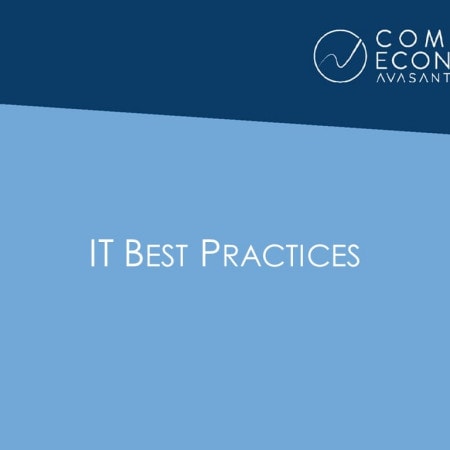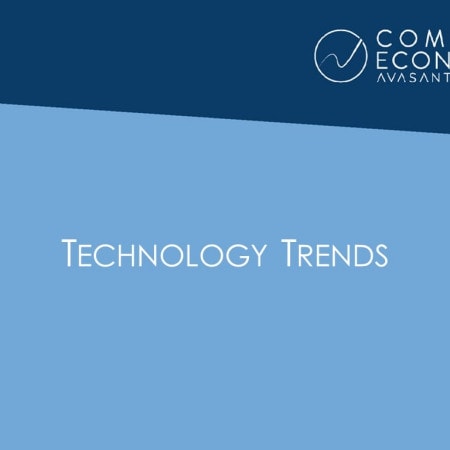-

Value Add Distribution in Manufacturing Illustrates Ebusiness Transaction Density Patterns (Feb 2002)
One of the big challenges in planning, creating, and supporting electronic supply chain systems (ESCS) is to determine the volume that a system must be able to handle and how many organizations the system must support.
May, 2002
-

The Future of Wireless Mobile Commerce
Mobile commerce (m-commerce) would seem to have an almost unlimited potential. Considering projections that over one billion users will possess PDAs or other devices equipped for wireless data by 2004, the attraction of selling to this group is high, but Computer Economics recommends taking a realistic view of m-commerce in light of the technological and cultural issues that must be resolved before sales can take off.
May, 2002
-

Resolve the Domainland Dilemma (Sep 2001)
Seven new top-level domains (TLD) go live fall 2001. These new Internet addresses will complicate the lives of IT managers--especially those whose companies are e-commerce merchants. Other companies also need to be concerned because of impacts that the new domains will have on intellectual property and Internet browsers.
May, 2002
-

Top-Level Domains Challenge IT Managers (Apr 2001)
If they have not started beforehand, by June 2001 many IT managers will be thinking frequently about top-level domains (TLD). Among the causes for their increased concern will be seven recently approved TLDs, more use of country suffixes, copyright protection, and the growing trend toward domain names in foreign languages. All of these events will require more effort to maintain control over the increased complexity of Internet usage.
May, 2002
-

The NBA: Using the Internet to Increase Revenue
The long-term goals of any e-commerce website are to increase revenue, increase traffic, and establish the company name while, at the same time, expanding to provide broader services and more products to the marketplace. It is a tall order for any company and especially optimistic when the company's goal is to achieve a leading role in web-based interactive streaming media.
May, 2002
-

Tracking and Navigation Systems Boom (Jan 2001)
J.D. Power Clubs' carclub.com plans to offer Airbiquity's Global Positioning System (GPS) wireless Accessory for under $200. The service is expected to include roadside assistance; accident assistance; route support; and concierge services, such as locating hotels, restaurants, ATMs, and hospitals. This is the first distribution agreement for the Airbiquity GPS Accessory. Computer Economics expects similar services to be offered by automobile manufacturers and other auto-related clubs.
May, 2002
-

Seeking the Key to Successful B2B Collaboration (Dec 2001)
The driver for B2B collaboration, despite numerous obstacles and failures, is simple to appreciate: the payoff from these efforts is significant increases in revenues during the period of 2002 through 2006. Furthermore, these returns are independent of company size. Large companies can gain through such collaborations by means of establishing exchanges with suppliers and business partners that can generate revenues themselves, along with reduced costs, increased efficiencies, faster times to market, and improved product quality. Small companies, on the other hand, can benefit from participating in exchanges through entry into markets that they could not penetrate on their own.
May, 2002
-

Questions and Answers on the Privacy Provisions of the Gramm-Leach-Bliley Act (Jan 2002)
Why does the Privacy Rule sometimes refer to consumers and other times to customers? Aren't customers also consumers? All customers are consumers, but not all consumers are customers. The rule distinguishes consumers from customers because it is the banks responsibilities to provide notices to consumers and to customers differ in several respects.
May, 2002
-

The Children’s Online Privacy Protection Act of 1998 (Jul 2000)
In June 2000 the United States Appeals Court ruled that the Children's Online Privacy Protection Act of 1998 (COPPA) was unconstitutional and violated the first amendment. There are mixed opinions about the ruling, but we suggest that all Web marketers remain in touch with the issue and understand the implications and requirements of COPPA.
May, 2002
-

First “Safe Harbor” Approved for Children’s Online Privacy Protection Act (Apr 2001)
In February 2001 The Federal Trade Commission announced that the Children's Advertising Review Unit of the Council of Better Business Bureaus (CARU), the children's arm of the advertising industry's self-regulatory program established in 1974, has been approved as the first "safe harbor" program under the terms of the Children's Online Privacy Protection Act. Safe harbor programs are industry self-regulatory guidelines that, if adhered to, are deemed to comply with the Act. This is the first COPPA safe harbor application approved by the Commission.
May, 2002
-

The European Union’s Privacy Initiatives (Jul 2000)
As the concern for privacy increases, governments around the world are working on legislation or have formed cross-border task forces to deal with privacy issues. We expect that the outcome of international privacy efforts will take several years to unfold and even longer to be implemented on a global basis. We also expect that national laws regarding privacy will continue to evolve around the world.
May, 2002
-

Employee Email and Internet Use Policies
Employees increasingly use email and the Internet while at work, both for work related purposes and frequently for personal use as well. The inability to distinguish between work and non-work related usage is sometimes problematic, and potentially exposes businesses to liability for a variety of claims from employees themselves, from clients, or even from third parties. Employers should be aware of the potential risks and of the measures that may help to decrease their exposure.
May, 2002
-

Medical Privacy in an Electronic Age—A Discussion of the Issues
As growing numbers of physicians, hospitals, pharmacies, and other health care providers start using the Internet to access patient records, increasingly large databases of patient information can be created and harvested. This trend towards quick and broad access to data has generated mounting public concern over the privacy and confidentiality of such information. Fortunately, technological tools exist which, if implemented, can actually provide greater security for electronic patient data than is generally available for paper-based records.
May, 2002
-

EDI Practices in 2002 (May 2002)
Many people speculated that the Internet and the World Wide Web would be the death of EDI. Wrong! EDI is alive and well according to the 13th annual Information Systems and E-Business Spending study conducted by Computer Economics. EDI via direct dial connections with suppliers remains one of the most popular methods for organizations to exchange large amounts of data.
May, 2002
-

Increase Supply Chain Visibility Through Modularity
Facing increased competition stemming from a slowing economy, many companies are taking a closer look at their basic operation in an attempt to improve efficiency. The supply chain is one area that can offer significant paybacks from wise investments. The primary strategy to adopt in upgrading supply chain operations is to emphasize visibility. Providing managers, suppliers, business partners, and customers with real time information regarding part and product inventories enables them to make sound business decisions.
May, 2002

 Grid View
Grid View List View
List View